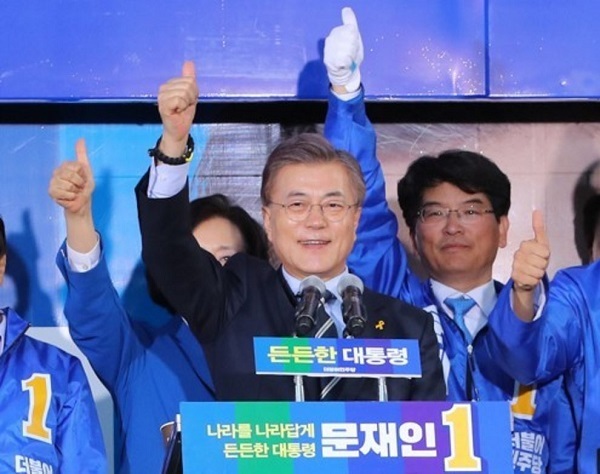Presidential front-runner Moon Jae-in vowed Tuesday to enforce the use of vacation days to ensure the notoriously overworked nation gets more rest.
The nominee of the liberal Democratic Party made the pledge on his Facebook page as the nation is set to mark a series of public holidays next week.
 |
Moon Jae-in, presidential nominee of the Democratic Party, gives a thumbs-up on the campaign trail in Cheonan, 92 kilometers south of Seoul, on April 24, 2017. (Yonhap) |
"I want to give the people a life with a comma," he wrote. The Korean word for comma literally means "rest symbol." He added, "We all have the right to rest. We truly work a lot."
According to Moon, a recent survey conducted ahead of a vacation season showed that more than 5,000 out of some 57,000 respondents were unable to have a summer break. Meanwhile, a labor ministry study found that the average number of vacation days was 14.2 but the average number used was 8.6, or 60.4 percent.
"People couldn't rest because they neither had the time nor money," Moon claimed.
After three public holidays next week, the nation will also rest on May 9, which has been designated a temporary public holiday for the presidential election.
"With the election ahead, I'm worried about voter turnout, but I also think about whether the people will be able to get proper rest," Moon said. "The next government will restore the right to rest for our hardworking people."
If elected, Moon promised to introduce more substitute holidays for when a public holiday falls on a weekend. He also pledged to provide government subsidies to encourage workers to take vacations, saying such measures could help boost local economies.
Other plans include discounts on accommodation and transportation for pregnant women and parents with young children, tourism programs tailored for senior citizens, and more and improved vacation spots such as camping sites and recreational forests.
"Rest leads to new production," Moon said. "Through rest, we grow to sympathize with each other, and that sympathy is the driving force behind national integration." (Yonhap)







![[Today’s K-pop] Blackpink’s Jennie, Lisa invited to Coachella as solo acts](http://res.heraldm.com/phpwas/restmb_idxmake.php?idx=644&simg=/content/image/2024/11/21/20241121050099_0.jpg)
